Roosevelt addresses Congress on December 8 to ask for a declaration of war.
Archive for the ‘Chapter 34’ Category
4 Mar
Excerpts from the “Arsenal of Democracy” speech
As you read, listen to how FDR tries to show that isolationsists are appeasers and why the British need our help so that we may hopefully not have to fight.
You can listen to an audio recording of FDR giving this speech here: http://www.americanrhetoric.com/speeches/fdrarsenalofdemocracy.html
Excerpts from the “Arsenal of Democracy” speech
December 29, 1940
My friends:
This is not a fireside chat on war. It is a talk on national security; because the nub of the whole purpose of your President is to keep you now, and your children later, and your grandchildren much later, out of a last-ditch war for the preservation of American independence, and all of the things that American independence means to you and to me and to ours.
Tonight, in the presence of a world crisis, my mind goes back eight years to a night in the midst of a domestic crisis. It was a time when the wheels of American industry were grinding to a full stop, when the whole banking system of our country had ceased to function. I well remember that while I sat in my study in the White House, preparing to talk with the people of the United States, I had before my eyes the picture of all those Americans with whom I was talking. I saw the workmen in the mills, the mines, the factories, the girl behind the counter, the small shopkeeper, the farmer doing his spring plowing, the widows and the old men wondering about their life’s savings. I tried to convey to the great mass of American people what the banking crisis meant to them in their daily lives.
Tonight, I want to do the same thing, with the same people, in this new crisis which faces America. We met the issue of 1933 with courage and realism. We face this new crisis, this new threat to the security of our nation, with the same courage and realism. …
The Nazi masters of Germany have made it clear that they intend not only to dominate all life and thought in their own country, but also to enslave the whole of Europe, and then to use the resources of Europe to dominate the rest of the world. It was only three weeks ago that their leader stated this: “There are two worlds that stand opposed to each other.” And then in defiant reply to his opponents he said this: “Others are correct when they say: ‘With this world we cannot ever reconcile ourselves.”’ I can beat any other power in the world.” So said the leader of the Nazis.
In other words, the Axis not merely admits but the Axis proclaims that there can be no ultimate peace between their philosophy — their philosophy of government — and our philosophy of government….
Some of our people like to believe that wars in Europe and in Asia are of no concern to us. But it is a matter of most vital concern to us that European and Asiatic war-makers should not gain control of the oceans which lead to this hemisphere. One hundred and seventeen years ago the Monroe Doctrine was conceived by our government as a measure of defense in the face of a threat against this hemisphere by an alliance in Continental Europe. Thereafter, we stood guard in the Atlantic, with the British as neighbors. There was no treaty. There was no “unwritten agreement.” And yet there was the feeling, proven correct by history, that we as neighbors could settle any disputes in peaceful fashion. And the fact is that during the whole of this time the Western Hemisphere has remained free from aggression from Europe or from Asia.
Does anyone seriously believe that we need to fear attack anywhere in the Americas while a free Britain remains our most powerful naval neighbor in the Atlantic? And does anyone seriously believe, on the other hand, that we could rest easy if the Axis powers were our neighbors there? If Great Britain goes down, the Axis powers will control the Continents of Europe, Asia, Africa, Austral-Asia, and the high seas. And they will be in a position to bring enormous military and naval resources against this hemisphere. It is no exaggeration to say that all of us in all the Americas would be living at the point of a gun — a gun loaded with explosive bullets, economic as well as military. We should enter upon a new and terrible era in which the whole world, our hemisphere included, would be run by threats of brute force. And to survive in such a world, we would have to convert ourselves permanently into a militaristic power on the basis of war economy.
Some of us like to believe that even if Britain falls, we are still safe, because of the broad expanse of the Atlantic and of the Pacific. But the width of those oceans is not what it was in the days of clipper ships. At one point between Africa and Brazil the distance is less than it is from Washington to Denver, Colorado, five hours for the latest type of bomber. And at the north end of the Pacific Ocean, America and Asia almost touch each other. Why, even today we have planes that could fly from the British Isles to New England and back again without refueling. And remember that the range of the modern bomber is ever being increased….
Some nations of Europe were bound by solemn nonintervention pacts with Germany. Other nations were assured by Germany that they need never fear invasion. Nonintervention pact or not, the fact remains that they were attacked, overrun, thrown into modern slavery at an hour’s notice — or even without any notice at all….The Nazis have justified such actions by various pious frauds. One of these frauds is the claim that they are occupying a nation for the purpose of “restoring order.” Another is that they are occupying or controlling a nation on the excuse that they are “protecting it” against the aggression of somebody else. For example, Germany has said that she was occupying Belgium to save the Belgians from the British….
The experience of the past two years has proven beyond doubt that no nation can appease the Nazis. No man can tame a tiger into a kitten by stroking it. There can be no appeasement with ruthlessness. There can be no reasoning with an incendiary bomb. We know now that a nation can have peace with the Nazis only at the price of total surrender. Even the people of Italy have been forced to become accomplices of the Nazis; but at this moment they do not know how soon they will be embraced to death by their allies.
The American appeasers ignore the warning to be found in the fate of Austria, Czechoslovakia, Poland, Norway, Belgium, the Netherlands, Denmark, and France. They tell you that the Axis powers are going to win anyway; that all of this bloodshed in the world could be saved, that the United States might just as well throw its influence into the scale of a dictated peace and get the best out of it that we can. They call it a “negotiated peace.” Nonsense! Is it a negotiated peace if a gang of outlaws surrounds your community and on threat of extermination makes you pay tribute to save your own skins? For such a dictated peace would be no peace at all. It would be only another armistice, leading to the most gigantic armament race and the most devastating trade wars in all history. And in these contests the Americas would offer the only real resistance to the Axis power. With all their vaunted efficiency, with all their parade of pious purpose in this war, there are still in their background the concentration camp and the servants of God in chains.
The history of recent years proves that the shootings and the chains and the concentration camps are not simply the transient tools but the very altars of modern dictatorships. They may talk of a “new order” in the world, but what they have in mind is only a revival of the oldest and the worst tyranny. In that there is no liberty, no religion, no hope. The proposed “new order” is the very opposite of a United States of Europe or a United States of Asia. It is not a government based upon the consent of the governed. It is not a union of ordinary, self-respecting men and women to protect themselves and their freedom and their dignity from oppression. It is an unholy alliance of power and pelf to dominate and to enslave the human race.
The British people and their allies today are conducting an active war against this unholy alliance. Our own future security is greatly dependent on the outcome of that fight. Our ability to “keep out of war” is going to be affected by that outcome. Thinking in terms of today and tomorrow, I make the direct statement to the American people that there is far less chance of the United States getting into war if we do all we can now to support the nations defending themselves against attack by the Axis than if we acquiesce in their defeat, submit tamely to an Axis victory, and wait our turn to be the object of attack in another war later on.
If we are to be completely honest with ourselves, we must admit that there is risk in any course we may take. But I deeply believe that the great majority of our people agree that the course that I advocate involves the least risk now and the greatest hope for world peace in the future….
I want to make it clear that it is the purpose of the nation to build now with all possible speed every machine, every arsenal, every factory that we need to manufacture our defense material. We have the men, the skill, the wealth, and above all, the will. I am confident that if and when production of consumer or luxury goods in certain industries requires the use of machines and raw materials that are essential for defense purposes, then such production must yield, and will gladly yield, to our primary and compelling purpose.
So I appeal to the owners of plants, to the managers, to the workers, to our own government employees to put every ounce of effort into producing these munitions swiftly and without stint. With this appeal I give you the pledge that all of us who are officers of your government will devote ourselves to the same whole-hearted extent to the great task that lies ahead.
As planes and ships and guns and shells are produced, your government, with its defense experts, can then determine how best to use them to defend this hemisphere. The decision as to how much shall be sent abroad and how much shall remain at home must be made on the basis of our overall military necessities.
We must be the great arsenal of democracy.
4 Mar
Excerpt from the “Four Freedoms” address
Nearly a year before Pearl Harbor, FDR elucidates the moral reasons for supporting those who are fighting the Fascists in Europe and Asia in his “State of the Union” address to Congress in January of 1941.
You can listen to an audio version of this speech here:
http://www.americanrhetoric.com/speeches/fdrarsenalofdemocracy.html
Just as our national policy in internal affairs has been based upon a decent respect for the rights and the dignity of all our fellow men within our gates, so our national policy in foreign affairs has been based on a decent respect for the rights and the dignity of all nations, large and small. And the justice of morality must and will win in the end.
Our national policy is this:
First, by an impressive expression of the public will and without regard to partisanship, we are committed to all-inclusive national defense.
Secondly, by an impressive expression of the public will and without regard to partisanship, we are committed to full support of all those resolute people everywhere who are resisting aggression and are thereby keeping war away from our hemisphere. By this support we express our determination that the democratic cause shall prevail, and we strengthen the defense and the security of our own nation.
Third, by an impressive expression of the public will and without regard to partisanship, we are committed to the proposition that principles of morality and considerations for our own security will never permit us to acquiesce in a peace dictated by aggressors and sponsored by appeasers. We know that enduring peace cannot be bought at the cost of other people’s freedom.
In the recent national election there was no substantial difference between the two great parties in respect to that national policy. No issue was fought out on this line before the American electorate. And today it is abundantly evident that American citizens everywhere are demanding and supporting speedy and complete action in recognition of obvious danger….
The Congress of course, must rightly keep itself informed at all times of the progress of the program. However, there is certain information, as the Congress itself will readily recognize, which, in the interests of our own security and those of the nations that we are supporting, must of needs be kept in confidence.
New circumstances are constantly begetting new needs for our safety. I shall ask this Congress for greatly increased new appropriations and authorizations to carry on what we have begun.
I also ask this Congress for authority and for funds sufficient to manufacture additional munitions and war supplies of many kinds, to be turned over to those nations which are now in actual war with aggressor nations. Our most useful and immediate role is to act as an arsenal for them as well as for ourselves. They do not need manpower, but they do need billions of dollars’ worth of the weapons of defense.
The time is near when they will not be able to pay for them all in ready cash. We cannot, and we will not, tell them that they must surrender merely because of present inability to pay for the weapons which we know they must have….
Let us say to the democracies: “We Americans are vitally concerned in your defense of freedom. We are putting forth our energies, our resources, and our organizing powers to give you the strength to regain and maintain a free world. We shall send you in ever-increasing numbers, ships, planes, tanks, guns. That is our purpose and our pledge.”
In fulfillment of this purpose we will not be intimidated by the threats of dictators that they will regard as a breach of international law or as an act of war our aid to the democracies which dare to resist their aggression. Such aid — Such aid is not an act of war, even if a dictator should unilaterally proclaim it so to be.
And when the dictators — if the dictators — are ready to make war upon us, they will not wait for an act of war on our part.
They did not wait for Norway or Belgium or the Netherlands to commit an act of war. Their only interest is in a new one-way international law, which lacks mutuality in its observance and therefore becomes an instrument of oppression. The happiness of future generations of Americans may well depend on how effective and how immediate we can make our aid felt. No one can tell the exact character of the emergency situations that we may be called upon to meet. The nation’s hands must not be tied when the nation’s life is in danger….
Certainly this is no time for any of us to stop thinking about the social and economic problems which are the root cause of the social revolution which is today a supreme factor in the world. For there is nothing mysterious about the foundations of a healthy and strong democracy.
The basic things expected by our people of their political and economic systems are simple. They are:
Equality of opportunity for youth and for others.
Jobs for those who can work.
Security for those who need it.
The ending of special privilege for the few.
The preservation of civil liberties for all.
The enjoyment — The enjoyment of the fruits of scientific progress in a wider and constantly rising standard of living.
These are the simple, the basic things that must never be lost sight of in the turmoil and unbelievable complexity of our modern world. The inner and abiding strength of our economic and political systems is dependent upon the degree to which they fulfill these expectations….
I have called for personal sacrifice, and I am assured of the willingness of almost all Americans to respond to that call. A part of the sacrifice means the payment of more money in taxes. In my budget message I will recommend that a greater portion of this great defense program be paid for from taxation than we are paying for today. No person should try, or be allowed to get rich out of the program, and the principle of tax payments in accordance with ability to pay should be constantly before our eyes to guide our legislation.
If the Congress maintains these principles the voters, putting patriotism ahead pocketbooks, will give you their applause.
In the future days, which we seek to make secure, we look forward to a world founded upon four essential human freedoms.
The first is freedom of speech and expression — everywhere in the world.
The second is freedom of every person to worship God in his own way — everywhere in the world.
The third is freedom from want, which, translated into world terms, means economic understandings which will secure to every nation a healthy peacetime life for its inhabitants — everywhere in the world.
The fourth is freedom from fear, which, translated into world terms, means a world-wide reduction of armaments to such a point and in such a thorough fashion that no nation will be in a position to commit an act of physical aggression against any neighbor — anywhere in the world….
3 Mar
“The unseen Dorothea Lange”
Found this link about the famous photographer, Dorothea Lange, whose iconic photographs of migrant farm workers during the Great Depression put a human face on the suffering that the working classes endured during this crisis.
http://cnnphotos.blogs.cnn.com/2013/10/01/the-unseen-dorothea-lange/?hpt=hp_c3
I’m actually posting this more for later this year, but here is it anyway.
1 Mar
Norman Rockwell’s paintings of the Four Freedoms
Read the story behind the paintings here: http://www.americainwwii.com/articles/norman-rockwell-and-the-four-freedoms/
Although Norman Rockwell was not liked very much by the art critics, he was enormously popular. His work was far too sentimental to be critically acclaimed. However, as a draftsman he was quite skilled, and he was very adept at using small details to get his point accross.
The first freedom was the freedom from want. This poster became the most famous and was also known as “The Thanksgiving painting.” Notice how he draws the observer into the painting by having the man in the lower right corner looking back outside the painting at you, thus placing the observer in the family gathered around the table. As a poster (not in the original painting), this painting is being used to encourage enlistment and support of the military.
Another freedom was freedom of worship. Notice the inclusion of the German-looking woman who is obviously Roman Catholic, since she is praying the rosary. This one also includes an African-American.
A third freedom was freedom from fear. Mom and dad tucking the kids into bed– and yes, siblings shared beds and bedrooms all the time in those days, even though this is a two-story house.
And a final freedom was freedom of speech. As the link explained this was based on a real incident at a school board meeting in the town where Rockwell was staying. The man speaking was opposed by almost everyone in the room in what he proposed, but they still respected his right to speak. And class distinction does’t matter– he’s in work clothes, while nearly everyone else is in a suit and tie. Those were the days!
Notice how three of these paintings were turned into posters to encourage buying war bonds.
27 Feb
Chapter 34 questions
Due Monday, March 3.
1. What was the position taken by FDR in his foreign relations policy during the early years of his administration, with regard to: Latin America, the Philippines, the USSR, and economic cooperation with Europe and foreign trade? You can make a chart if you like. What was the overall effect of these moves?
2. How did FDR respond to the early aggressions by what would eventually be the Axis powers? What WERE these early aggressive acts? What were some indications that the American people did NOT want the government to intervene?
3. What were the specifics of the various Neutrality Acts between 1935-1937? What happened to the international sale of American goods, particularly weapons?
4. What position did the American government and the American people take on the Spanish Civil War? What American involvement was there?
5. What were the specific circumstances that led to the “Quarantine” speech? Explain the use of the term “quarantine,” and what it implies. What resulted from this speech, and why?
6. What agreements did Hitler conclude in 1938-1939 that allowed him to strengthen his military position? What was he preparing to do after each agreement, specifically? Which countries had Hitler annexed/ conquered by June of 1940?
7. How many Jewish refugees did America give shelter to, and why? Be specific in your answer.
8. What finally caused Congress to pass a conscription law? What did that signify about American neutrality?
9. What was the destroyers deal about? How had public opinion changed in regard to helping Britain?
10. Why did FDR decide to run for a third term in 1940? Who was his opponent? What was the platform of each candidate? What did they both agree upon?
11. What were the details of the lend-lease program? How was this different from the destroyers deal?What did the US do when the Germans invaded the USSR?
12. What is the significance of the Greer, the Kearny, and the Reuben James?
13. What demand did FDR make that convinced the Japanese that war was inevitable with the US?
14. Why was the attack on Pearl Harbor a surprise? What had FDR believed about the site of a possible attack?
15. By December 1, 1941, what opinion did most Americans hold about joining the war?
16. What was the purpose of the Atlantic Conference, and who attended it? What was decided there, specifically, about war aims?
17. Create a timeline of the following events: Pearl Harbor attack, Munich Conference, Atlantic Conference, German-Soviet non-aggression pact, Fall of France, invasion of Poland, German invasion of the USSR.
18. What did FDR do in regard to the London economic conference, and why?
19. Explain this quote from the text: “Congress was one war too late” with its neutrality legislation.
20 Compare the aims of the Committee to Defend America by Aiding the Allies with the America First Committee. Who were the famous people associated with each group?
21. How and when did FDR’s foreign policy change from isolationism to interventionism?
22. Why did FDR’s policy change from isolationism?
26 Feb
The effect of World War II on the Income Tax system
Good article– very clear: http://money.cnn.com/2013/02/01/news/economy/taxes-middle-class/index.html?iid=SF_BN_River
15 Mar
Practice MC for World War II
1. The main reason why a majority of women left the workforce at the end of World War II was
A. union demands.
B. employer demands that they quit.
C. male discrimination on the job.
D. government requirements to hire veterans.
E. family obligations.
2. Shortly after Hitler and Stalin signed a non-aggression pact,
A. Britain and France signed a similar agreement.
B. the Soviets attacked China.
C. Germany invaded Poland and started World War II.
D. Italy signed a similar agreement with the Soviets.
E. the Germans invaded Finland.
3. The US military refused to bomb Nazi gas chambers such as those at Auschwitz and Dachau because of the belief that
A. bombing would kill the Jews kept there.
B. the military was unsure of the gas chambers’ location.
C. such attacks would not seriously impede the killing of the Jews.
D. the US believed the assurances of Hitler that the camps were for legitimate penal purposes only.
E. bombing would divert essential military resources.
4. The 1941 lend-lease program was all of the following EXCEPT
A. another privately arranged deal, like the trade for destroyers.
B. a direct challenge to Axis dictators.
C. the point when the pretense of American neutrality was abandoned.
D. the catalyst that caused American factories to prepare for all-out war.
E. a focus of intense debate between internationalists and isolationists
5. In the Quarantine speech, what does FDR propose we quarantine?
A. lawless nations
B. economically depressed nations
C. Saddam Hussein
D. our allies
E. Italy and Spain as fascist countries
6. African-Americans did all of the following during WWII EXCEPT
A. fight in integrated combat units.
B. move north in large numbers.
C. move west in large numbers.
D. form a militant organization called the Congress for Racial Equality.
E. support the “Double-V” campaign.
7. The conquest of the island of Guam in the ___________ chain was especially important to US success in the Pacific, because from there the US could conduct round-trip bombing raids on the Japanese home islands.
A. Guadalcanal
B. Wake
C. Okinawa
D. New Guinea
E. Marianas
8. According to your textbook, the main reason given by the top command in Washington for placing Japanese-Americans in internment camps was that Japanese-Americans
A. might act as saboteurs for the Japanese government in case of invasion.
B. had colluded in the attack on Pearl Harbor.
C. had no loyalty to the US.
D. were more suspect than German-Americans, since they had no Anglo-Saxon heritage.
E. lacked Christian values as most were Buddhists.
9. The major consequence of the Allied conquest of Sicily in August 1943 was
A. a modification of the demand for the unconditional surrender of Italy.
B. the overthrow of Mussolini and Italy’s unconditional surrender.
C. the swift Allied conquest of the Italian peninsula.
D. a conflict between Churchill and General Eisenhower over the invasion of the Italian mainland.
E. the threat of a Communist takeover of the Italian government.
10. At the Tehran Conference,
A. the USSR agreed to declare war on Japan within three months.
B. the Big Three allies agreed to divide postwar Germany into separate occupied zones.
C. the USSR agreed to allow free elections in Eastern European nations that it occupied at the end of the war.
D. plans were made for opening a second front in western Europe.
E. it was agreed that the Big Five powers would have veto power in the united Nations.
13 Mar
Weblinks about the Holocaust
“Righteous Persons” (sometimes called “Righteous Gentiles”) were those who risked their lives saving Jews from Hitler’s evil “Final Solution,” which is also referred to as “the Holocaust” or “the Shoah.” This site gives brief stories about some of the Righteous: http://www.jewishvirtuallibrary.org/jsource/Holocaust/righteous.html and there are some numbers broken down by country of the Righteous here: http://www.holocaustforgotten.com/yadvashem.htm
Yad Vashem is the Holocaust Memorial and Museum in Israel. Here is a link to a pictorial archive showing photos from the lives of some of those who perished at tha hands of the Nazi regime: http://collections.yadvashem.org/photosarchive/en-us/ You can search for the names of victims here: http://www.yadvashem.org/wps/portal/IY_HON_Welcome. Yad Vashem also has its own YouTube channel: www.youtube.com/user/YadVashem.
7 Mar
Links from class discussion 3/7
Holocaust Timeline that we used in class: http://www.historyplace.com/worldwar2/holocaust/timeline.html
Color depiction of the perfect Aryans:
Norman Rockwell’s paintings of the Four Freedoms: http://www.loc.gov/exhibits/treasures/images/at0058a.5s.jpg
And some interesting videos:
Chamberlain declaring “Peace in Our Time!:
And Walt Disney gets into the war against fascism!
Donald Duck finds out what it would be like to live under Nazi rule. Can this be real? Watch out for the really… rude racial stereotypes)
Donald Duck is urged to pay his taxes in the middle of World War II:
And Dr. Seuss did his part: http://libraries.ucsd.edu/speccoll/dspolitic/
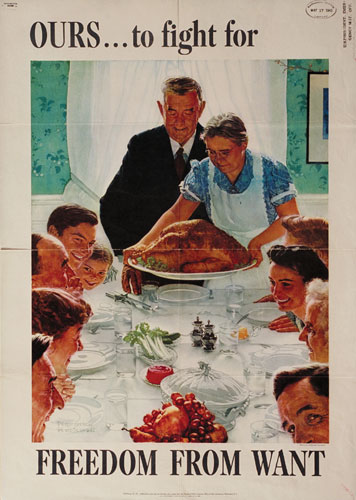
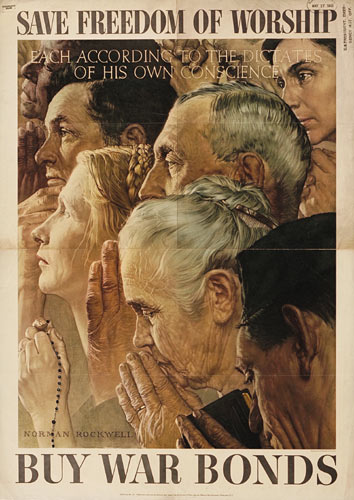
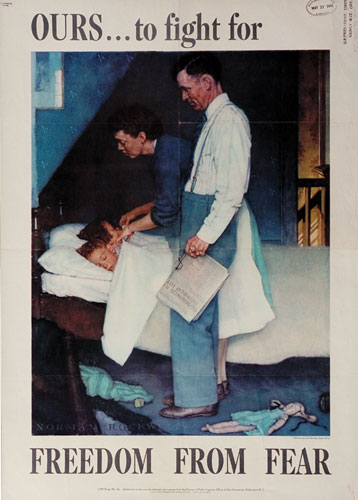
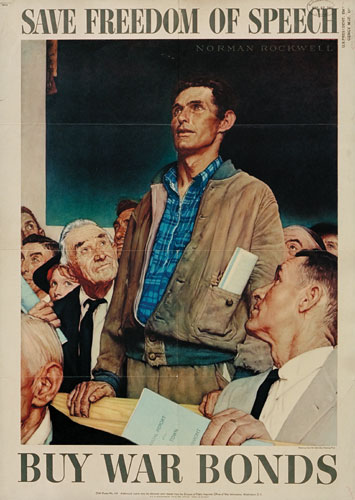
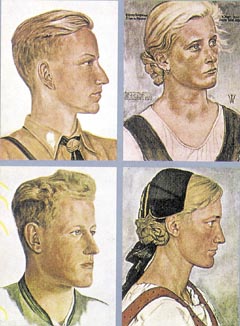

You must be logged in to post a comment.